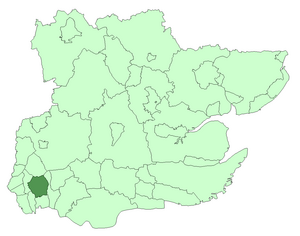Ilford Urban District
| Ilford | |
|---|---|
 Ilford (now Redbridge) Town Hall |
|
 Ilford within Essex in 1961 |
|
| Area | |
| • 1911 | 8,496 acres (34.38 km2) |
| • 1931 | 8,493 acres (34.37 km2) |
| • 1961 | 8,404 acres (34.01 km2) |
| Population | |
| • 1911 | 78,188 |
| • 1931 | 131,061 |
| • 1961 | 178,024 |
| Density | |
| • 1911 | 9.2/acre |
| • 1931 | 15.4/acre |
| • 1961 | 21.2/acre |
| History | |
| • Origin | Chadwell and Ilford wards of Barking parish |
| • Created | 1888 |
| • Abolished | 1965 |
| • Succeeded by | London Borough of Redbridge |
| Status |
Civil parish (1888—1965) Local board (1890—1894) Urban district (1894—1926) Municipal borough (1926—1965) |
| • HQ | Ilford |
| • Motto | In unity progress |
 Coat of arms of the borough council |
|
Ilford was a civil parish and local government district in south west Essex, England from 1888 to 1965, covering the town Ilford. The district saw a considerable rise in population throughout its life, caused by the expansion of the built-up area of London, and became one of the most populous districts of its type in England. The district now corresponds to the greater part of the London Borough of Redbridge in Greater London.
Ilford had historically formed a ward in Barking parish, but in 1888 with the Chadwell ward it became a separate civil parish. The area had formed part of the Metropolitan Police District since 1840. A local board was formed for Ilford in 1890 and in 1894 it became an urban district under the Local Government Act 1894.
The urban district council was originally based in rooms above a shop in Cranbrook Road, meeting in a rented schoolroom in Ilford Hall from 1898. The building of Ilford Town Hall began in 1901, completed at a cost of about £30,000. This was designed by B. Woollard in an ornate Renaissance style; it was enlarged in 1927 and 1933.
Successive acts provided the council with increased powers and they used these to embark on an expansion of public services, providing sewerage, public baths, an isolation hospital, a fire station, an electricity and tramway undertaking, and several public parks – including Valentine's Park, opened as Central Park in 1898. In 1904, the council also took over the responsibilities of the school board.
In 1926, the urban district was incorporated as a municipal borough. The borough ran its own tram services until they became the responsibility of the London Passenger Transport Board in 1933.
...
Wikipedia
